President Tsai Ing-wen (蔡英文) yesterday pledged to defend the nation’s sovereignty and democracy amid “unprecedented challenges” brought by China’s increasing military coercion, and to ensure Taiwan would not be forced to take the path China has laid out for it.
Tsai in her Double Ten National Day speech reiterated Taiwan’s determination to defend itself, and maintain regional peace and stability, which she said is being challenged by China’s increasing military coercion in the South and East China seas, as well as in the Taiwan Strait.
Reiterating her Democratic Progressive Party’s stance on cross-strait relations, Tsai said her administration’s goodwill toward Beijing would not change.
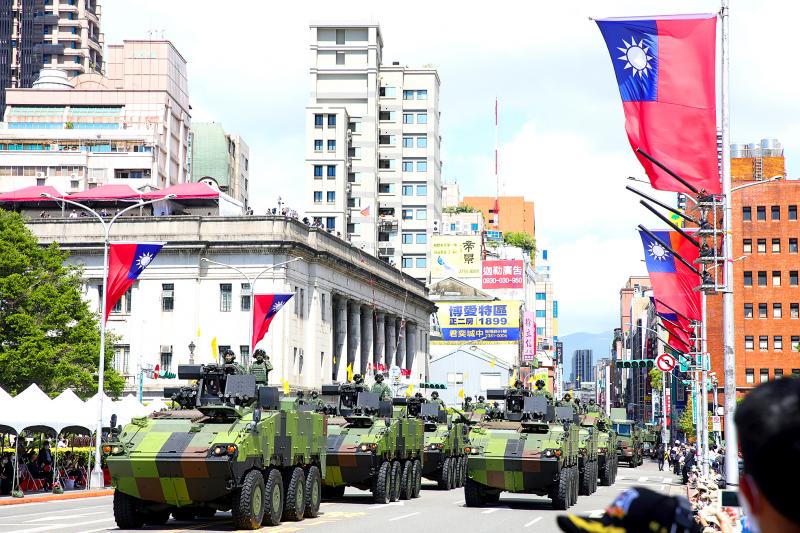
Photo: I-Hwa Cheng, Bloomberg
The government would continue to do its part to prevent the cross-strait “status quo” from being changed unilaterally, she said.
However, resolving cross-strait differences “requires the two sides of the Strait to engage in dialogue on the basis of parity,” she added.
Taiwan would not act rashly and will do its best to ease tensions, she said, adding that “there should be absolutely no illusions that Taiwanese will bow to pressure.”
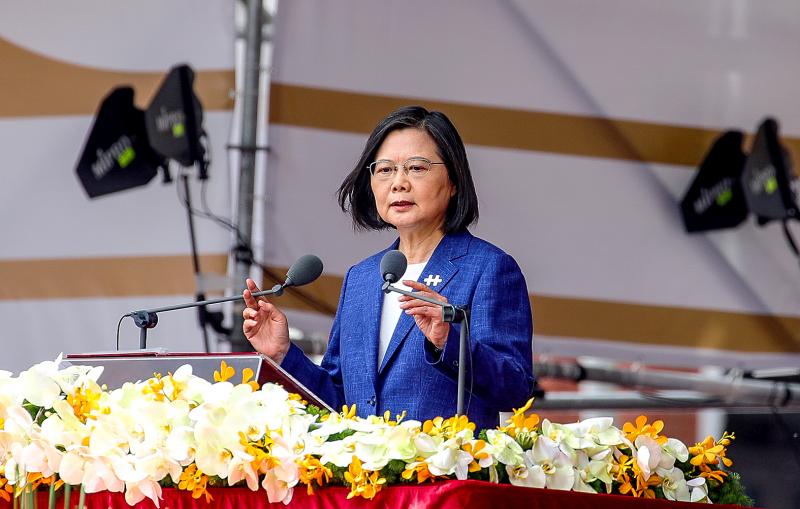
Photo: I-Hwa Cheng, Bloomberg
“We will continue to bolster our national defense, and demonstrate our determination to defend ourselves and to ensure that nobody can force Taiwan to take the path China has laid out for us,” she said. “This is because the path that China has laid out offers neither a free and democratic way of life for Taiwan, nor sovereignty for our 23 million people.”
Tsai laid out four commitments that she said should serve as common ground for all Taiwanese, regardless of their political affiliations, in remarks apparently directed at Chinese Nationalist Party (KMT) Chairman Eric Chu (朱立倫), Taiwan People’s Party Chairman Ko Wen-je (柯文哲) and New Power Party Chairwoman Chen Jiau-hua (陳椒華), who also attended the ceremony.
“Let us here renew with one another our enduring commitment to a free and democratic constitutional system, our commitment that the Republic of China and the People’s Republic of China should not be subordinate to each other, our commitment to resist annexation or encroachment upon our sovereignty, and our commitment that the future of the Republic of China [Taiwan] must be decided in accordance with the will of Taiwanese,” Tsai said.
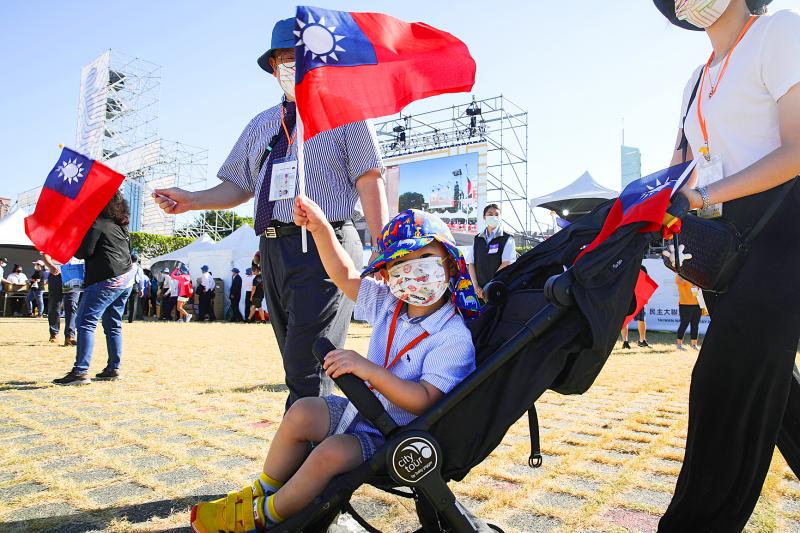
Photo: I-Hwa Cheng, Bloomberg
“On the basis of this shared foundation, we have a responsibility to seek an even broader consensus, so that we can be united in the face of future challenges,” she said.
Tsai also thanked Japan, the US, Lithuania, Slovakia, the Czech Republic and Poland for their donations of COVID-19 vaccines, even though the COVID-19 pandemic continues and vaccines are in short supply.
The nation’s donations of masks to countries worldwide last year showed that Taiwan can help, Tsai said, adding that “the vaccines they sent us this year are vaccines of friendship.”
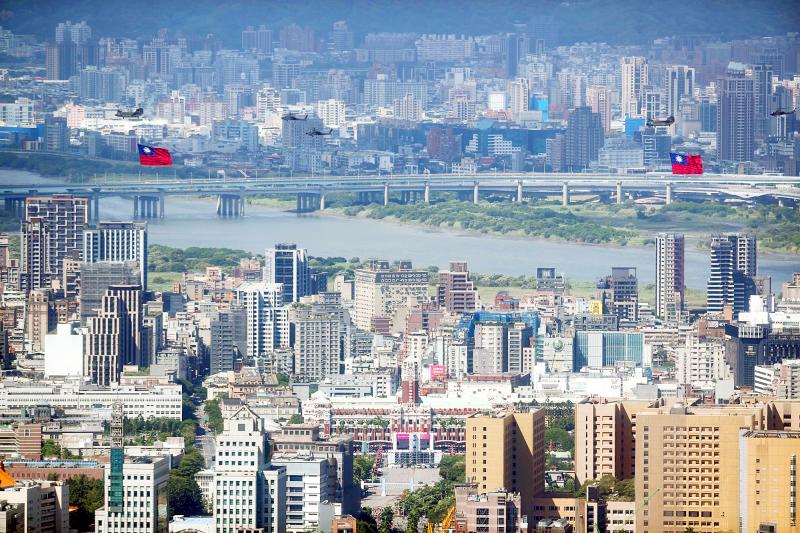
Photo: CNA
“This is a virtuous cycle, and I can assure the international community that Taiwan will continue to contribute to the world and expand this virtuous cycle,” she said.
Although the pandemic hurt domestic consumption, it did not affect Taiwan’s overall economic growth prospects, Tsai said.
In particular, a global shortage of semiconductors has highlighted Taiwan’s importance in global supply chains, she said.
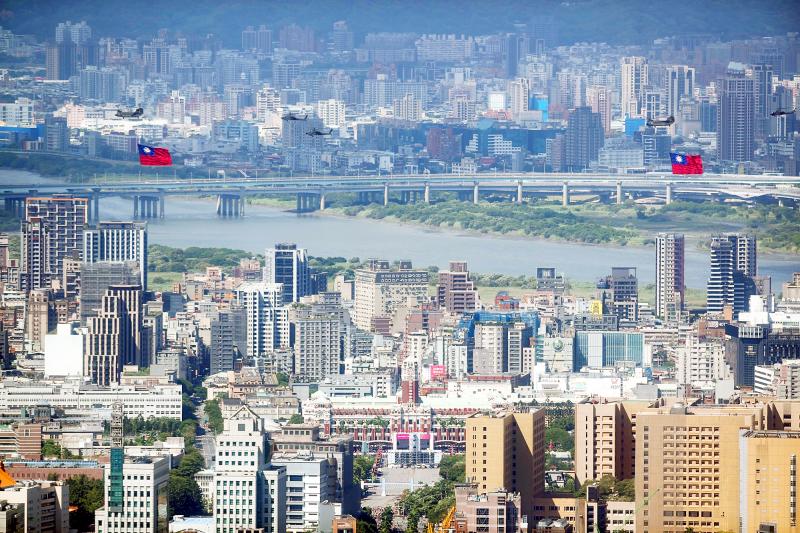
Photo: CNA
The world has begun to pay attention to Taiwan’s key position in the region, she added.
The nation’s determination to expand trade ties with major partners has been demonstrated by the resumption of Taiwan-US Trade and Investment Framework Agreement meetings, and its application to join the Comprehensive and Progressive Agreement for Trans-Pacific Partnership, Tsai said.
“We believe we have the ability to work with like-minded partners to contribute to the international community. Taiwan today is no longer seen as the orphan of Asia, but as an island of resilience that can face challenges with courage,” she said.

MAKING WAVES: China’s maritime militia could become a nontraditional threat in war, clogging up shipping lanes to prevent US or Japanese intervention, a report said About 1,900 Chinese ships flying flags of convenience and fishing vessels that participated in China’s military exercises around Taiwan last month and in January have been listed for monitoring, Coast Guard Administration (CGA) Deputy Director-General Hsieh Ching-chin (謝慶欽) said yesterday. Following amendments to the Commercial Port Act (商港法) and the Law of Ships (船舶法) last month, the CGA can designate possible berthing areas or deny ports of call for vessels suspected of loitering around areas where undersea cables can be accessed, Oceans Affairs Council Minister Kuan Bi-ling (管碧玲) said. The list of suspected ships, originally 300, had risen to about 1,900 as

Japan’s strategic alliance with the US would collapse if Tokyo were to turn away from a conflict in Taiwan, Japanese Prime Minister Sanae Takaichi said yesterday, but distanced herself from previous comments that suggested a possible military response in such an event. Takaichi expressed her latest views on a nationally broadcast TV program late on Monday, where an opposition party leader criticized her for igniting tensions with China with the earlier remarks. Ties between Japan and China have sunk to the worst level in years after Takaichi said in November that a hypothetical Chinese attack on Taiwan could bring about a Japanese

MORE RESPONSIBILITY: Draftees would be expected to fight alongside professional soldiers, likely requiring the transformation of some training brigades into combat units The armed forces are to start incorporating new conscripts into combined arms brigades this year to enhance combat readiness, the Executive Yuan’s latest policy report said. The new policy would affect Taiwanese men entering the military for their compulsory service, which was extended to one year under reforms by then-president Tsai Ing-wen (蔡英文) in 2022. The conscripts would be trained to operate machine guns, uncrewed aerial vehicles, anti-tank guided missile launchers and Stinger air defense systems, the report said, adding that the basic training would be lengthened to eight weeks. After basic training, conscripts would be sorted into infantry battalions that would take

DEEP-STRIKE CAPABILITY: The scenario simulated a PLA drill that turned into an assault on Taiwan’s critical infrastructure, with the launchers providing fire support Taiwan yesterday conducted this year’s first military exercises at Longsiang Base in Taichung, demonstrating the newly acquired High Mobility Artillery Rocket System’s (HIMARS) ability to provide fire support and deep-strike capabilities. The scenario simulated an attack on Penghu County, with HIMARS trucks immediately rolling into designated launch areas and firing barrages at the Wangan (望安) and Cimei (七美) islands, simulating the provision of fire support against invading forces. The HIMARS are supposed to “fire and leave,” which would significantly increase personnel and equipment survivability, a military official said. The drill simulated an exercise launched by the Chinese People’s Liberation Army (PLA) Eastern